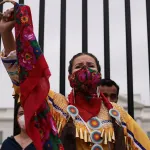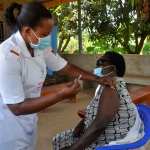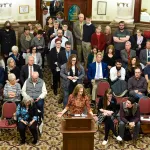Whenever someone dies in her family, Marci McLean gathers with her loved ones for a four-day wake. At least one member of the family stays near the body day and night, until finally, on the fourth day, as singing and drumming fill the air, it is time for the burial. Afterward, they gather for a meal and the spiritual burning of sweetgrass. Throughout the four days, the family laughs together.
“Laughter is healing. Our laughter is like no other I’ve been around,” McLean said.
But she was not able to grieve in her family’s traditional way when her aunt died from COVID-19 last year.
“She went to the hospital, and we never saw her again,” McLean said. “I think it has severely or critically interrupted that grieving process. My biggest fear is to lose another close family member.”
McLean grew up hearing her ancestors’ stories of loss and resilience of the Blackfeet Nation in northwestern Montana. With COVID-19 surging among Indigenous populations like her own, McLean now fears the worst: that the generational knowledge of her ancestors — including language, oral stories and medicinal practices — will be erased. McLean is the executive director of Western Native Voice, a nonprofit dedicated to uplifting Indigenous communities through advocacy and leadership development. In her current role, she believes that she embodies her women ancestors who took control of caregiving during difficult times.
It is on her Blackfeet land that the Baker Massacre took place, when the American Army took roughly 200 lives on January 23, 1870, as part of the Indian Wars. As of today, COVID-19 has killed 46 people on Blackfeet land, which has compounded this generational loss and “traumatized her communities to unsettling degrees,” McLean said.
“We’re very connected through everything we’ve been through. …We have lived through the genocide and the colonization of the dominant culture. … Reliance on each other and on the family is critical to our survival,” McLean said.
Native Americans in Montana made up 19 percent of COVID-19 cases and 32 percent of COVID-related deaths from March to October, despite representing roughly 6.7 percent of the state’s population, according to data from the Montana Office of Epidemiology. Native Americans are also more likely to die from COVID-19 than White people, in part because many disproportionately suffer from preexisting conditions such as diabetes, heart disease, hypotension and obesity.
Since March, McLean has worked with public health expert Cora Neumann to train over 150 government, public health and tribal officials and over 400 community leaders in COVID-19 safety and response. Neumann said the majority of the organizations dedicated to dispersing aid to tribal lands are led by women.
“We need to listen to women. Women are leading the charge,” Neumann said. “They’re the backbone and the foundation of public health.”
Neumann, who has studied primary care for rural and Native communities, founded the nonprofit We Are Montana in May 2020 to focus specifically on delivering crucial public health information to the rural and Indigenous populations. Neumann also aims to empower Montana’s majority-women public health leaders. Women make up 76 percent of the nation’s health care jobs, according to the U.S. Census Bureau’s 2019 data; in Montana, they make up 80 percent of the positions.
Having an effective strategy for communication — including emails, Zoom webinars and social media pages on how to social distance and stay safe — is crucial in managing fears in the Native community that Neumann said were caused by federal leadership early in the pandemic.
“The Trump administration sowing doubt and creating chaos and spreading misinformation,” Neumann said. “It was a horrible, perfect storm, to have so little leadership at a time when people were facing the most deadly plague of our lifetimes.”
We Are Montana partnered with Western Native Voice to create a relief fund — now at $250,000 — where Montana’s Indigenous people can submit requests for necessities and Neumann and her team distribute supplies on a first-come first-serve basis.
Neumann got requests from homes that didn’t have bathrooms and needed hot water, a necessity to maintain hygiene and reduce the risk of contracting COVID-19. Historically, access to clean hot water has been difficult for those living on Blackfeet Nation, McLean said.
“With colonization and colonial movement, the waters have been polluted,” McLean said. “So access to clean water has been a barrier for many of our people.”
This is even more essential in Native American communities where intergenerational housing is more common for both cultural and economic reasons. As caretakers of these large family houses, Women have been spearheading the COVID-19 response efforts as part of their traditional duty, McLean said.
“We as women are the caretakers. We are the life givers. We are the ones who take care of the basic needs of our communities and our families,” McLean said. “I’ve heard of a couple of our medicine women back home making teas for people who have been sick, to help them get through and fight the virus, to have the immune system to fight the virus.”
McLean and Neumann are also working on airlifting winter clothes to the tribal nations using money from the fund, all a part of leaders’ goal to elevate the baseline health status of their Native communities as part of the COVID-19 recovery plan.
On the federal level, McLean and Neumann hope their community’s health concerns will be prioritized in President Joe Biden’s proposed $1.9 trillion recovery plan.
As of now, Biden does plan to target the health disparities of Native American communities. “Biden is calling on Congress to give Tribes the resources they need to obtain sufficient personal protective equipment, increase access to clean water and electricity, and expand internet access so that children can learn remotely and more families can obtain basic health care through telemedicine,” a statement from the White House read.
Looking ahead, McLean hopes leaders honor treaty rights of her people’s land and that Native people and Native women representation in government grows. The House of Representatives currently seats five Native Americans, a record, but McLean says this is just the beginning.
“Our families are surviving. Our families are thriving, and they are hurting through this,” she said. “I wonder what our communities are going to look like in five or 10 years. How do we come back stronger?”





